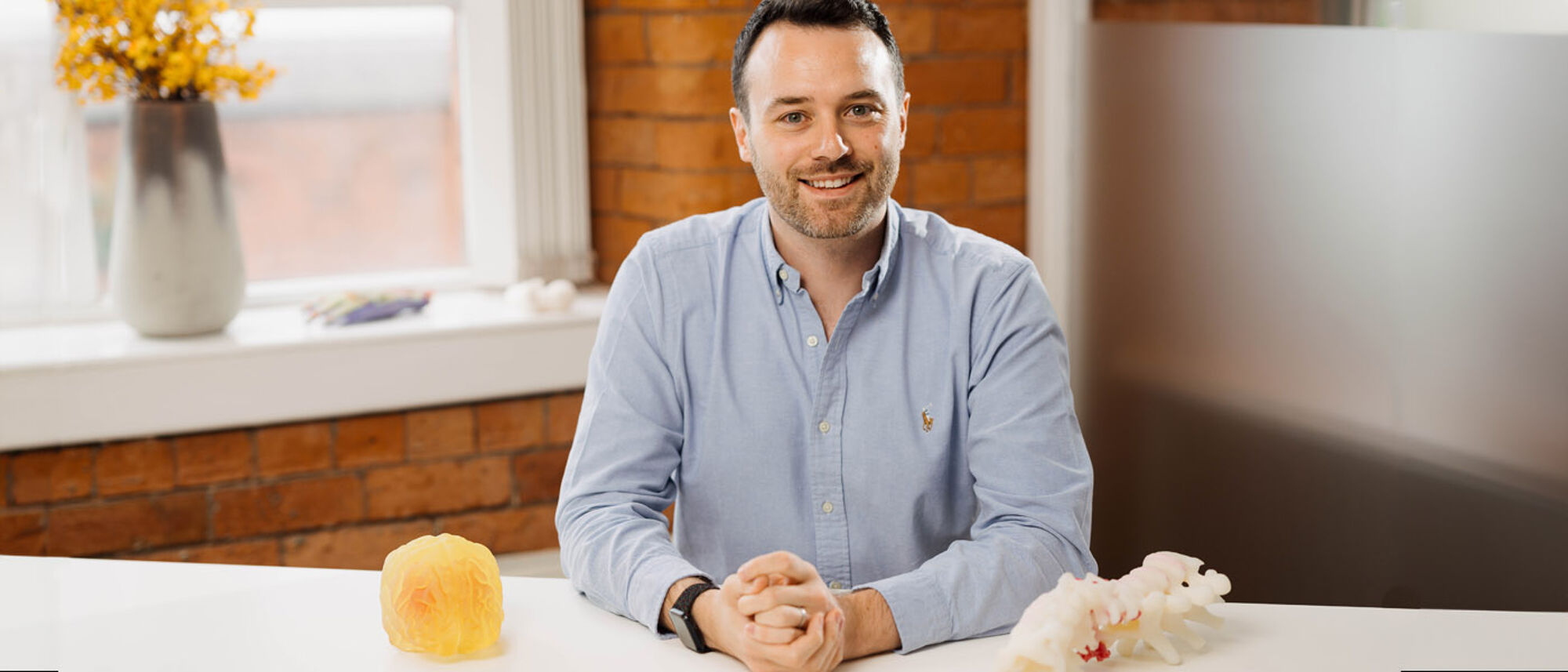
A new dimension in healthcare
Founder of the award-winning AI medical software company Axial3D, Daniel Crawford (MSc 2013) has added to his successes by being voted our World Changing Alumni Award winner for 2023. Launched in 2015, Daniel’s company creates precise 3D visualisations that have helped surgeons and other healthcare professionals in over 30 countries to develop more effective, patient-specific treatment plans.
"The 3D models that we make from the 2D scans can be used to build things like custom knee or hip replacements or evaluate things like sizings of heart valves. This really improves the standard of care a patient can be given by tailoring it to them more precisely.
“We take 2D images that you'd find in a hospital, so mainly CT and MRI scans, and put them through our proprietary machine learning algorithms to convert them into 3D representations. And what we're finding is, in around 50% of cases, surgeons are changing a diagnosis or plan when they look at the 3D model. It allows a surgeon, radiologist or clinician to understand more about what is actually going on with that patient – and sometimes that leads to a large change in the diagnosis.
I did my masters in Medical Visualisation & Human Anatomy as a joint degree with the Glasgow School of Art. Researchers there had the ability to take the 2D images from the hospital then turn them into 3D visualisations and volumetric designs – so it kept both sides of my brain very happy!

Axial3D's cloud-based ordering software.
Inspiring stories
The best part of my job, hands down, is the stories that we get about patients. The ones that are really dear to me are the paediatric cases, particularly paediatric cardiology. We’ve had cases where kids were going for palliative care because surgeons didn’t know how to treat their conditions at all, but when we gave them 3D prints of their hearts, they were able to invent new methods of treating these patients and giving them full life expectancies.
"It's a really easy way to motivate my team, when they can see the direct outputs of what they're doing – helping to improve the standard of care and actually, in some cases, saving lives.
Glasgow's an incredible city – I have some of my best memories from it. I lived with an eclectic mix of people in an old tenement flat on Hillhead St, so literally five doors down from the library. I was the only person from the UK there – the others were from Estonia, Ukraine, France, Germany and Portugal. It was really nice to have that mix of nationalities and personalities all in one place, which I'd never really experienced before.
My favourite thing to do away from work is spend time with family as much as I can get – I have a two-year-old son, so that's raised a lot of new fun challenges for me, with Axial3D now my second ‘child’. The other thing that I like to do when I get time is cook – typically, things that take lots of preparation, that you cook over two or three days. The more complicated the better!

3D-printed paediatric heart used to rehearse complex surgery.
Watershed moment
Winning the World Changing Alumni Award means the world to me, as Glasgow has always had a special place in my heart. School and traditional academia never really resonated with me and I never did very well in terms of grades – but when I went to Glasgow and picked something that I actually wanted to do, it unlocked this knowledge in me that if I do things that I love, I'll work really hard at them and do well. Having this kind of recognition for that is incredible.”
All images courtesy of Simon Hutchinson Photography.
This article was first published January 2024.
Return to Avenue homepage
Main image above: Daniel Crawford with 3D-printed brain and spine.
WORLD CHANGING ALUMNI AWARD
This is a prestigious annual University honour which recognises and celebrates the achievements of alumni who have made a major contribution to the community, arts, science or business. It has been presented to a world-changing alumnus every year since 2001 – previous winners have included Mark Beaumont, Selina Hales and Emeli Sandé.

Daniel’s work aligns with two of the United Nations’ Sustainable Development Goals, Good health and wellbeing (SDG3) and Industry, innovation and infrastructure (SDG9).
SDG 3 – Good health and wellbeing
“The more tailored that surgeons can make a procedure for a patient,” says Daniel, “the better the health and wellbeing of that patient will be in their lifetime. People know, for example, that knee replacements aren't perfect. Usually within 10 to 15 years, they will come loose or be misaligned so that they need to go in for a revision surgery which, for the NHS and the healthcare system, is extremely costly. Also for the patient, obviously it's not great to be going through a second surgery and a more complex one, too. What our technology will unlock is that ability for that single surgery to happen so that the health and wellbeing of that patient, long term, can be much improved.”
SDG 9 – Industry, innovation and infrastructure
“Over the last seven or eight years, we've built a very strong infrastructure in Belfast and Glasgow, where we've made a really competent team with some of the best engineers in the world to solve complex problems such as image segmentation in medical applications. This is the kind of thing that is big enough and meaty enough to contribute to an entire industry, as opposed to just being a siloed company in itself. It allows more innovation to happen outside of just Axial3D.”


